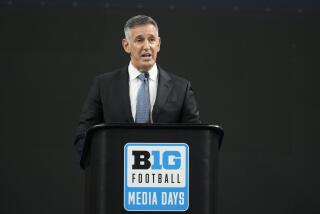Have-Nots Are Uniting Against BCS
- Share via
A committee formed by 44 presidents from non-bowl championship series member universities has agreed to meet with BCS officials in Chicago on Sept. 8 to discuss the future of major college football, but a spokesman for the 17-person panel made it clear that the status quo would not be acceptable.
“I think our preference would be that the BCS go away completely,” University of Tulane President Scott Cowen said Tuesday during a teleconference with reporters.
The BCS was created in 1998 as a way to pair the nation’s top two teams in a national title game with ranking systems. The BCS is essentially controlled by Notre Dame, ABC television, the four major bowls and commissioners from the so-called “power” football power conferences: Pacific 10, Big Ten, Atlantic Coast, Big East, Southeastern and Big 12.
Representatives from the five Division I-A non-BCS conferences say the BCS has disproportional control over major college football and want the arrangement drastically altered when the BCS contract expires after the 2005 season. BCS conferences will receive more than $900 million in revenue over the course of the eight-year contract. The BCS revealed Monday that it will distribute $42 million to non-BCS schools in that span.
Presidents from non-BCS schools also believe changes in criteria for remaining Division I-A status, which will go into effect in 2004, are an effort to weed out teams from major college play.
Among the changes are minimum scholarship and attendance requirements.
“This is classic cartel behavior,” University of Buffalo President Bill Greiner said. “It’s what John D. Rockefeller tried to do with his competitors. Drive up their costs. Make it more difficult for them.”
Presidents from the non-BCS schools say they have a strong antitrust case against the BCS but would rather settle the issues amicably.
“That would only be a very, very last resort as far as I’m concerned,” Cowen said of possible legal action. “I do not think it would be productive for higher education and universities for us to be suing each other .... But I think this is such an important issue to all of us that I think we cannot rule out any options right now.”
BCS officials on Monday extended an invitation for a Sept. 8 summit but also ruled out the possibility of an “NFL-style” playoff for college football, a plan that had been floated by non-BCS members.
BCS officials said Monday they did not think their coalition represented a monopoly and maintained that non-BCS teams do have access to the system in that any non-BCS team that finishes ranked No. 6 or higher in the final BCS standings automatically receives a bid to one of the four major bowls--Rose, Sugar, Orange and Fiesta.
Yet, in the BCS’ five-year history, no non-BCS team has played in a major bowl game.
Cowen says the reason is simple: The deck is stacked. “Remember,” Cowen said, “that was a BCS ranking. That was a conceived ranking by the BCS to control what schools get into it. That ranking has a distinct bias.”
Cowen felt the perceived snub first-hand in 1998, when Tulane went 11-0 yet was denied a major bowl bid because it did not achieve a high enough ranking in a BCS system that considers subjective polls, computers and a strength of schedule index.
“We’re not looking for some handout here,” Cowen said. “We’re looking for access and a level playing field, then whatever happens happens. If we can’t compete at that level then, by god, that’s our problem.”
More to Read
Go beyond the scoreboard
Get the latest on L.A.'s teams in the daily Sports Report newsletter.
You may occasionally receive promotional content from the Los Angeles Times.











